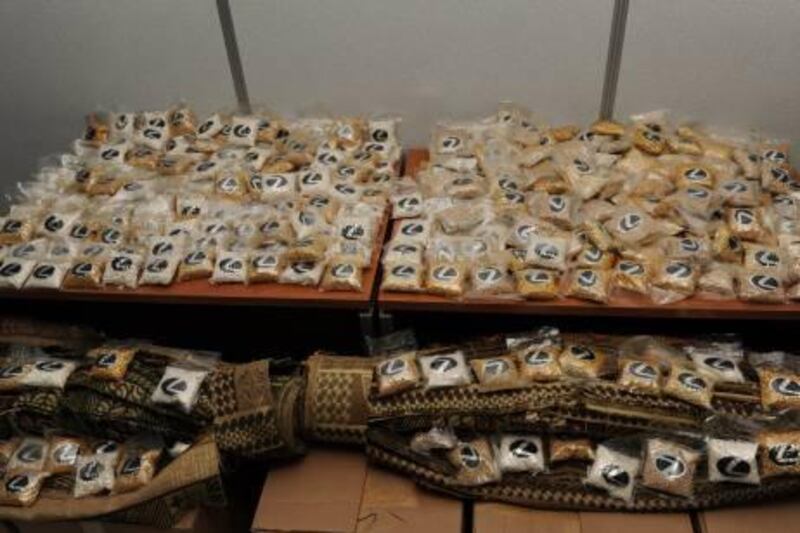DUBAI // The amount of amphetamines seized by Emirates customs nearly tripled in just one year, according to figures released yesterday by the United Nations.
The UN World Drug Report found that there had been an increase from 46kg to 129kg between 2008 and 2009.
Beate Hammond, the report co-author and expert on synthetic drugs at the UN Office on Drugs and Crime (UNODC), saidit was likely that the bulk of the seizures were of the stimulant sold under the name Captagon.
"We can safely say that around 90 per cent of seizures would have been Captagon," she said. "That's because it is the primary drug problem in the UAE."
While not having a large local market for methamphetamines - the highly addictive crystal meth - the region's countries were used as shipment hubs for large markets in South East Asia.
"Dubai Customs has made many seizures of methamphetamines, but these were seizures which were intended for other markets," said Ms Hammond. "Specifically they were headed for Malaysia, Singapore and China."
Captagon was a legal but regulated drug until the early 1980s. It contains fenethylline, a milder alternative to amphetamine.
However, the drug available on the black market today does not bear any similarity to the original product marketed under that name. Some studies have suggested modern "Captagon" contains 11 substances.
"The market for synthetic drugs is normally a fluid one, so the composition of the drug changes," said Ms Hammond. "Mostly, the tablets contain amphetamines but also other ingredients like caffeine."
The 2009 figures, while the most recent available, might not reflect the reality of drug use in the Emirates, with amphetamine addiction not as prevalent as before, said Dr Ahmed Yousif Ali, the medical director at the National Rehabilitation Centre in Abu Dhabi.
"The drugs scene changes every two or three years," Dr Ali said. "You might get heroin one year but two or three years later it has changed into prescription drugs. These days we are seeing more prescription drug addiction cases, with substances like the painkiller Tramadol. The supply is mostly from the black market."
The number of new addicts has also fallen in Dubai, according to Maj Gen Abdul Jalil Mahdi, the director of the Dubai Police Anti Narcotics Department.
Awareness campaigns have been credited with reducing the number of known new addicts from 192 in 2009 to 142 in 2010.
There are also signs that the number of seizures has fallen too. Data from Dubai Customs suggests a 53 per cent drop in drug seizures this year.
In 2010, there were 404 drug seizures at Dubai's borders, including 100 in the year's first quarter. In the same quarter this year there were 47 seizures.
Mohammed Mater Al Merri, the executive director of cargo operations at Dubai Customs, said traffickers had begun to look elsewhere to drugs, due to increased security at UAE borders.
Dubai Customs increased inspections at border crossings by 17 per cent last year. "The increase in the number of seizures has forced smugglers to use alternative routes," Mr Al Merri said.
Unlike heroin and cannabis, amphetamine is not grown in any particular region but synthesised from chemicals that are readily available.
Ms Hammond works for the UNODC's global monitoring unit, which supports governments in conducting forensic analyses of tablets.
She believes that by studying the composition of drugs such as Captagon it is possible to determine where they were made.
"The problem for law enforcement agencies at the moment is that we don't know where these drugs are coming from," she said. "The chemicals which are needed to synthesise these substances are available worldwide and the synthesis is normally not a complicated process."
Captagon has been linked to crime because of its effect on behaviour.
"It is a stimulant and has been known to cause psychosis and unprovoked violence," said Matthew Atha, a consultant at the Independent Drug Monitoring Group in the UK. "On the whole, it's a very dangerous drug."
amustafa@thenational.ae






